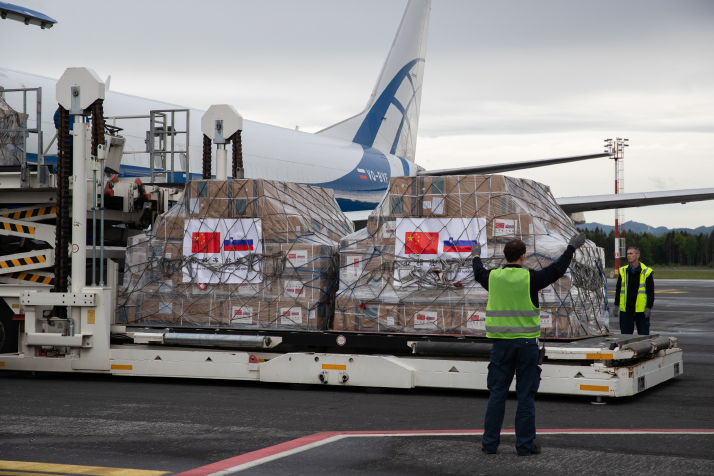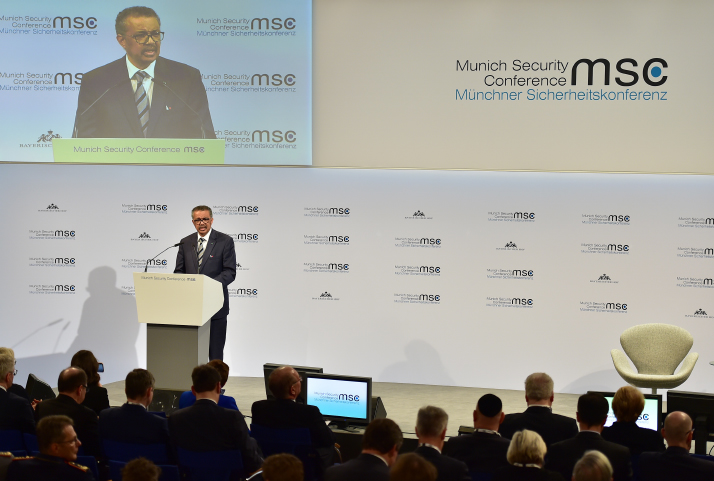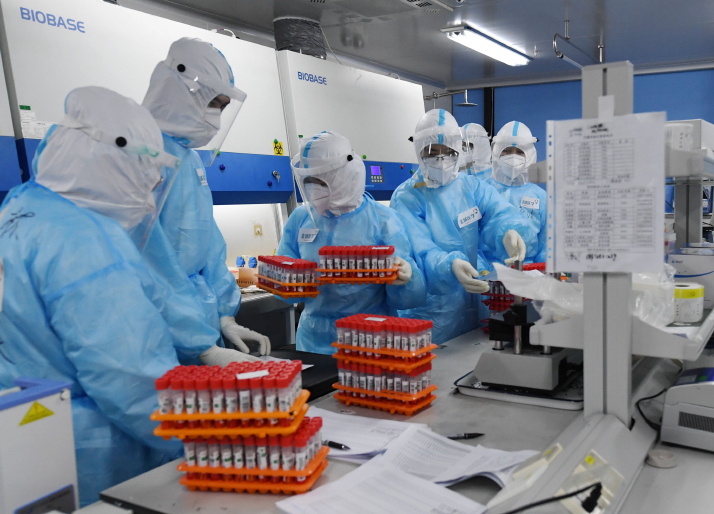| World |
| Lessons learned from the COVID-19 pandemic | |
| China's handling and sharing information on the COVID-19 virus has been transparent, speedy and responsible | |
|
|
 Medical supplies donated by China arrives in Ljubljana, Slovenia, on May 1 (XINHUA)
Today everything seems hunky-dory in Eyam, a pretty British village of 900 people southeast of Manchester. Children can be seen picking plump blackberries from hedgerows, cyclists amble on roads covered with fallen leaves. But in 1665, this idyllic village quarantined itself, with the residents making the heroic choice to sacrifice their lives to stop the spread of the bubonic plague. The same story of responsibility and heroism links Eyam in the 1660s with Wuhan in 2020 when it too made the same difficult choice after the novel coronavirus disease (COVID-19), a once-in-a-century deadly epidemic, hit the city of 11 million people in Hubei Province, central China. Thanks to the lockdown of Wuhan, the infections were controlled and valuable time was bought for the rest of China and the world to contain the disease. Yet despite the sacrifice, there are still groundless and politically motivated accusations to vilify China. The global narrative of COVID-19 should be objective and truthful, based on facts. Responsible response It is wrong to accuse China of covering up. China's handling and sharing information on the virus has been transparent, speedy and responsible. On December 27, 2019, a hospital in Hubei Province of China reported three cases of pneumonia of unknown causes for the first time. It was only two days later that relevant authorities carried out an epidemiological investigation. On December 31, four days afterward, the World Health Organization (WHO) office in China was notified. On January 3, Chinese officials provided information to WHO on the cluster of cases of "viral pneumonia of unknown cause" identified in Wuhan. The virus was separated on January 7. On January 12, the whole genome sequence of the novel coronavirus was shared with WHO, and the extremely contagious, cunning and harmful characteristics of the virus were notified, together with China's exploration of diagnosis and treatment methods. Since then, China has been keeping in contact with WHO and other countries and has been updating the data every day. Richard Horton, Editor in Chief of the medical journal The Lancet, said the message from China was absolutely clear: "…a new virus, with pandemic potential, was hitting cities." It is also wrong to say China did not release the real number of confirmed cases and the death toll. China has been releasing the data, including the number of diagnosed, suspected, severe and cured cases, in a timely manner. The epidemic was controlled due to the most comprehensive and rigorous possible prevention and control measures taken in a relatively early stage by the Chinese Government. Also, the Chinese, out of their inherent values to sacrifice individual benefit for collective good, cooperated with the containment measures. This resulted in China effectively controlling the epidemic on the mainland within three months, and resuming work and normal life. However, due to imported cases and an unknown number of asymptomatic infections, there are still a few new cases every day, and the possibility of another wave of the virus cannot be ruled out. The government, therefore, is still highly vigilant to guard against a resurgence. The U.S. and Europe, important contributors and promoters of the modern civilization, have reliable medical facilities, well-established early warning systems and developed healthcare. But today's situation proves that self-confidence is not enough to beat COVID-19. Instead, it became one of the underlying causes of the virus persistence. It is also wrong to claim that China's lockdown was delayed, which led to the spread of the virus. China's lockdown was the most swift and effective possible. It should be remembered that COVID-19 is a new virus, it is therefore natural for any country to take some time to make a scientific and prudent assessment of its character, transmissibility and severity before compassing proactive prevention and cure. No country would have announced the extreme measure of locking down when only a few dozen cases were found. In fact, the Chinese Government announced the lockdown of Wuhan on January 23, less than a month since the first case was reported. At that time, the total number of confirmed cases in China was 571 and only nine cases were confirmed outside China. It was not until January 30 that WHO declared the epidemic a public health emergency of international concern, which once again proved that there was no delay on the Chinese side. Fair evaluation It is wrong for those who failed to test, report and act timely to pin the blame on others. Should a country be considered the place of origin of the virus, held accountable and made to pay for others' inept responses simply because it was the first to honestly report what it found? When the epidemic occurred in China, a few politicians in the U.S. gloated about taking the opportunity to obtain economic benefits by moving U.S. companies back home from China. But when the virus spread to the U.S., they tried everything possible to shirk responsibility and pin the blame on China to deflect from their failure to handle it. Tracing the origin of a virus requires scientific, fact-based and professional assessment by scientists and medical experts. But a handful of politicians with little respect for science rushed to attach a geographical label to the coronavirus, politicize its source and stigmatize China. However, they both overestimated their own ability to spread disinformation and underestimated others' ability to tell right from wrong. Now more and more cases are being discovered outside China, and the types of the novel coronavirus found in China, the U.S. and European countries are different, suggesting that the disease might have appeared in other countries earlier on, and the tracing endeavor should be carried out on a global scale. China is open to joint efforts by the international science community to identify the source of the virus. However, it must be a professional, impartial and constructive process. It is also wrong to say that China's help to other countries to fight COVID-19 may be driven by geopolitical factors. Such accusations are more of a psychological calculation. In the U.S. mentality, China went very quickly within a few years from a developing country to a "dangerous counterpart," a "threat" and even an "enemy." This judgment, originating largely from the old mentality of power politics, does not fit in the 21st century. China has no intention to replace the U.S. It has repeated time and again that as the largest developing country and the largest developed country respectively, China and the U.S. shoulder great responsibility for global peace and development. China remains prepared to work with the U.S. in the spirit of no conflict or confrontation, mutual respect and win-win cooperation and build a relationship based on coordination, cooperation and stability. In the meantime, China will defend its sovereignty and territorial integrity, its legitimate right to development, and its dignity and place in the world which the Chinese people have worked so hard to earn. It is time for the U.S. to give up its wishful thinking of changing China or stopping 1.4 billion people's historic march toward modernization. In the global COVID-19 fight, China has assisted other countries because it is ready and willing to reciprocate the friendship and kindness it received during the most difficult time of its COVID-19 combat. China also believes that one country's success does not mean the end of the global pandemic; only when the virus is defeated in all countries can we claim a final victory. China would also like to be a friend in need and a sincere partner to be counted on in difficulty. It has done everything in the open, with no strings attached, with only one and clear objective: to save more lives. On February 29, China sent its first anti-COVID-19 medical expert team abroad. By early May, 26 medical expert teams had been dispatched to 24 countries, medical supplies sent to more than 150 countries and international organizations, and the containment experience, diagnosis and treatment plans were shared with 180 countries and 10 international and regional organizations. China donated $50 million to WHO. Faced with a global shortage of medical supplies, as the world's largest producer of medical protective suits and masks, it raced against time to meet the needs of other countries, exporting more than 56.8 billion surgical masks and 250 million protective gowns. The Chinese Government, to ensure the quality and safety of exported medical supplies, introduced stricter regulatory measures and cracked down on violations of laws and regulations. At the opening ceremony of the World Health Assembly 2020, President Xi Jinping elaborated China's anti-epidemic propositions, calling on countries to support the leadership of WHO and bolstering support for developing countries, especially African countries. He also advocated stepping up international macroeconomic policy coordination, keeping the global industrial and supply chains stable and unclogged, and restoring growth to the world economy. China will provide $2 billion over two years to help COVID-19 responses and economic and social development in the countries affected, especially developing ones. It will work with the UN to set up a global humanitarian response depot and hub on its soil, ensure the operation of anti-epidemic supply chains and establish fast tracks to facilitate transportation and customs clearance.  World Health Organization Director General Tedros Adhanom Ghebreyesus addresses the Munich Security Conference in Germany on February 15, where he applauded Chinese response to the novel coronavirus epidemic (XINHUA)
State liability farce The attempt to file frivolous lawsuits against China by some U.S. groups and individuals demanding so-called "compensation and accountability" has no legal foundation and international precedent. Customary international law on state responsibility holds that a state violating international law has "an obligation to make full reparation for the injury caused by the internationally wrong act." In another word, the precondition here is that the country has committed an international wrongful act. And in the meantime, this customary rule has played no discernable role in disease outbreaks over the long history of international health cooperation, and state has not been keen to use customary law on state responsibility in the infectious disease context. The origin of the devastating influenza pandemic of 1918-19 remains unclear though, yet the U.S. is on the list of potential countries of origin. The H1N1 virus that caused an influenza pandemic in 2009 was first detected in the U.S. Who shall compensate for that influenza and N1H1 then? The International Health Regulations contains a dispute settlement provision. However, countries have never used the dispute settlement provisions in infectious disease treaties from the 19th century till today, another indication that there is no international precedent to litigate and seek legal remedies in this area because of how political and epidemiological considerations align. China is a victim, like all other countries in the fight against COVID-19. Giving top priority to people's lives and health and safeguarding global public health, which were and remain the starting point of the government's response to the pandemic, China has, at an enormous cost and with huge sacrifice, taken unprecedented, comprehensive, thorough and rigorous measures which go far beyond the requirement of the International Health Regulations in many aspects. China has done an excellent job according to international law and under the International Health Regulations. It has set a new standard in fulfilling international obligations. Lose-lose decoupling Given the extensive and multifaceted links between the Chinese and U.S. economies, any decoupling would spell disaster for both. In the age of intensified globalization, national economic development is no longer a zero-sum game. There is no fundamental contradiction between the development of China and the U.S. Both can and should proceed apace, stand to gain from cooperation and lose from confrontation. In trade, for instance, China and the U.S. have complementary advantages and shared benefits. China is the United States' largest trading partner and their relations are a complicated mix of competition and cooperation. Cooperation is more important while competition should be based on international rules. The U.S. is a superpower but if it does not follow the rules, it will lose its long-term competitiveness. More seriously, the efforts to create a scapegoat for Washington's failure to deal with the virus will not only create confusion about the real causes of the crisis, thereby preventing the policy changes necessary for overcoming it, but also create more difficulties for the U.S. economy, which is still heavily reliant on Chinese products. The U.S. should laud how China showed, both in words and deeds, that solidarity and cooperation are the only weapons in the face of global challenges. Although the bilateral relations have taken a dive, continued escalation of tensions need not be the norm. The two sides could work in collaboration to share experience and learn from each other's best practices, to advance multilateral cooperation and contribute to the global response. They could coordinate macro policies to mitigate the long-term impact on the world economy and sustain global development.  Lab workers prepare samples to be tested for COVID-19 in Beijing on June 25 (XINHUA)
Rainbow after storm The pandemic has inspired us to collaboratively explore the best way to confront common challenges. When disaster strikes, watching from a safe distance and sitting idle will eventually backfire. Pointing fingers at others will only damage one's own reputation. Conceit and blame-shifting will not only hurt other countries' legitimate rights and interests, but also result in failure to solve one's own problems. In the face of mounting global challenges, no country can survive alone. The life and health of people in different countries have never been so closely connected. China has sped up efforts to build a community with a shared future for all. The pandemic has inspired us to evaluate the role of the government in honestly shouldering its responsibilities. Some politicians, instead of focusing on managing their own country, have attacked China's political system and incited discrimination against the Chinese. However, COVID-19 does not know politics. Spreading a political virus will definitely further damage the credibility of that country. China never picks a fight or bullies others. However, it will defend its honor and dignity and refute all slander to uphold fairness and justice. The pandemic has also inspired us to rethink the relationship between humanity and nature, teaching us that we must live in harmony with nature. Viruses are the footprints of evolution in nature. If we take them as a common enemy and together build a careful and scientific defense, we might win over this common challenge. Ignoring the real enemy with arrogance while fabricating false rumors or manipulating it as a political tool is doomed to be punished by nature. At this grim moment of global challenges, countries tend to be absorbed in their own national interests, but they have to look at things from a global standpoint instead of perspectives based only on individual narrow interests. They have to rise above differences in geography, race, history, culture and social systems to learn from nature. The author is an op-ed contributor to Beijing Review and an international studies expert (Print Edition: Working Together) Comments to yanwei@bjreview.com |
|
||||||||||||||||||||||||||||||
|
